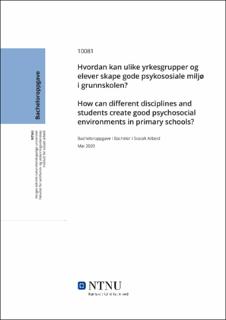| dc.contributor.advisor | Juberg, Anne | |
| dc.contributor.author | Svestad, Margrethe Bøe | |
| dc.date.accessioned | 2021-09-28T18:43:30Z | |
| dc.date.available | 2021-09-28T18:43:30Z | |
| dc.date.issued | 2020 | |
| dc.identifier | no.ntnu:inspera:56776074:22064418 | |
| dc.identifier.uri | https://hdl.handle.net/11250/2785615 | |
| dc.description.abstract | Store deler av barns liv tilbringes på skolen, som derfor utgjør en viktig rolle for deres utvikling både faglig og sosialt. Å trives på skolen er en av de viktigste forutsetningene for å lære, derfor er det viktig å ha et godt psykososialt miljø som fremmer helse, trivsel og læring. Et godt psykososialt miljø kjennetegnes av at elevene trives på skolen, opplever mestring og har tro på egne ferdigheter. Arbeid med å gjøre skolen til en inkluderende arena er spesielt viktig for å skape et godt psykososialt miljø og forebygge utenforskap. I denne oppgaven har jeg brukt Bronfenbrenners utviklingsøkologiske modell for å forklare hvordan barna og miljøet rundt dem samhandler og har gjensidig påvirkning på hverandre. Modellen forklarer hvilke forhold som virker inn på barnas psykososiale miljø i mikro-, meso-, ekso- og makrosystemene. Gjennom å kartlegge ulike forhold i systemene kan de ulike yrkesgruppene i skolen få en helhetlig forståelse av hvilke faktorer som virker inn på barnas utvikling. Mobbing og utfordringer i hjemmet er eksempler på risikofaktorer i det psykososiale miljøet som må fanges opp og arbeides systematisk med. I tillegg vil andre faktorer som samarbeidet mellom skole og hjem, det tverrfaglige samarbeidet ved skolen, politiske føringer og gjeldende lovverk ha indirekte påvirkning på barnas psykososiale miljø. | |
| dc.description.abstract | The greater part of children’s lives is spent in school, giving schools an essential role in their academic and social development. Being happy at school is one of the most important preconditions for learning, it is therefore important to have a good psychosocial environment that promotes health, well-being and learning. A good psychosocial environment is characterized by students enjoying school, achieving their goals and believing in their own abilities. Efforts to make the school an inclusive arena are especially important in creating a good psychosocial environment and preventing exclusion. In this paper I have used Bronfenbrenner´s ecological systems theory to explain how the children and the environment surrounding them interact and have mutual influence on each other. The theory explains what conditions affect the children´s psychosocial environment in the micro-, meso, exo- and macrosystems. Utilizing this method to organize cases enable the different disciplines in school to gain a comprehensive understanding of the factors that influence the children’s development. Bullying and challenges at home are examples of risk factors in the psychosocial environment that need to be recognized and worked on systematically. Other factors such as school-home collaboration, interdisciplinary collaboration at school, political guidelines and current legislation will also have an indirect impact on the children´s psychosocial environment. | |
| dc.language | | |
| dc.publisher | NTNU | |
| dc.title | Hvordan kan ulike yrkesgrupper og elever skape gode psykososiale miljø i grunnskolen? | |
| dc.type | Bachelor thesis | |
